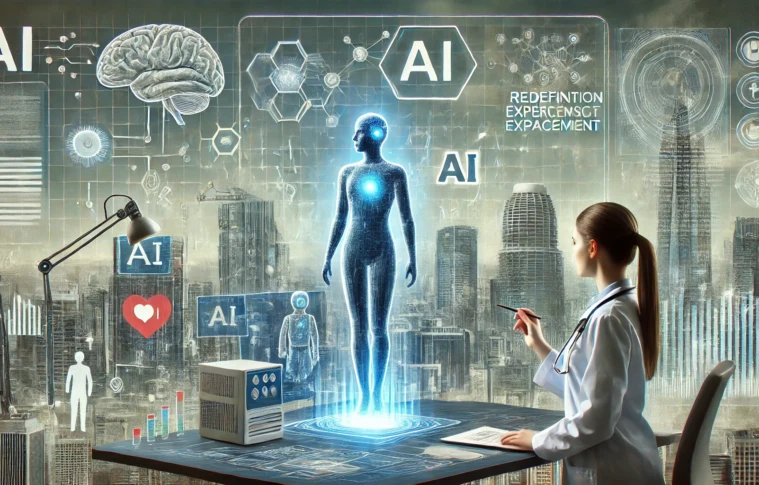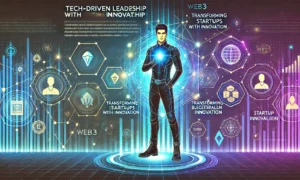Artificial intelligence (AI) is no longer confined to automating repetitive, low-skill tasks—it is making its way into high-skilled professions, transforming how work is performed in industries like healthcare, law, finance, and engineering. While AI enhances productivity and accuracy, it is also reshaping the skillsets required for traditionally expertise-driven roles.
Key Ways AI is Impacting High-Skilled Professions
- Augmenting Decision-Making:
- AI systems analyze vast datasets to provide insights that aid professionals in making better decisions.
- Example: In healthcare, AI-powered diagnostic tools help doctors identify diseases with greater precision.
- Automating Complex Processes:
- AI is automating high-skill tasks such as legal research, financial modeling, and architectural design.
- Example: Legal tech platforms like ROSS Intelligence use AI to scan legal databases and find relevant case law.
- Enhancing Creativity:
- AI tools are being used in creative industries to generate ideas, draft content, and even compose music or design graphics.
- Example: Tools like Adobe Sensei assist designers in creating complex visuals quickly and efficiently.
- Improving Efficiency and Accuracy:
- High-skilled tasks that require precision, such as medical imaging or engineering simulations, are being enhanced by AI.
- Example: AI-based simulations in aerospace engineering help reduce errors and optimize designs.
Industries Experiencing Significant Transformation
- Healthcare:
- AI is revolutionizing patient care with predictive analytics, robotic surgeries, and personalized treatment plans.
- Roles impacted: Radiologists, surgeons, and medical researchers.
- Legal and Compliance:
- AI tools streamline legal research, contract analysis, and regulatory compliance.
- Roles impacted: Lawyers, paralegals, and compliance officers.
- Finance:
- AI systems are transforming investment strategies, fraud detection, and financial risk assessments.
- Roles impacted: Financial analysts, auditors, and wealth managers.
- Engineering and Design:
- AI-powered CAD (computer-aided design) tools and simulations are changing how engineers and architects work.
- Roles impacted: Structural engineers, industrial designers, and architects.
Opportunities for High-Skilled Professionals
- Collaborating with AI:
- Professionals are using AI as a tool to augment their expertise rather than replace it.
- Example: Doctors leveraging AI diagnostics to cross-check findings and improve patient care.
- Upskilling in AI-Driven Technologies:
- High-skilled workers are increasingly required to understand and operate AI systems to stay competitive.
- Example: Lawyers gaining proficiency in legal tech platforms to enhance their efficiency.
- Focus on Strategic and Creative Tasks:
- With AI handling data-heavy tasks, professionals can concentrate on strategic decision-making and innovative problem-solving.
Challenges Posed by AI in High-Skilled Jobs
- Job Redundancy in Certain Roles:
- Tasks traditionally requiring years of expertise are now being automated, leading to concerns about job displacement.
- Example: AI’s ability to analyze X-rays is reducing the need for radiologists in some cases.
- Skill Gap:
- High-skilled professionals must adapt to rapidly evolving technologies, which can be challenging for those without technical backgrounds.
- Ethical and Trust Issues:
- Over-reliance on AI systems could lead to errors if the technology is flawed or misapplied. Professionals must ensure ethical use and maintain accountability.
Steps to Adapt
- Lifelong Learning:
- High-skilled workers must embrace continuous education to keep up with AI advancements.
- Online platforms and certifications in AI-related fields can help bridge the skill gap.
- Adopting a Collaborative Mindset:
- Viewing AI as a partner rather than a competitor is essential for leveraging its potential effectively.
- Focusing on Uniquely Human Skills:
- Emotional intelligence, creativity, and ethical judgment remain areas where humans outperform AI.
The Future of High-Skilled Work with AI
- Hybrid Roles:
- New roles that combine human expertise with AI tools will emerge, such as AI-enhanced doctors or AI-guided legal advisors.
- Higher Demand for Tech-Savvy Experts:
- Professionals who can integrate AI into their workflow will be in high demand.
- Focus on Ethical Oversight:
- Roles dedicated to ensuring responsible AI use, such as AI ethicists, will become critical.
Final Thoughts
AI is redefining high-skilled professions by automating complex tasks and augmenting human expertise. While this transformation poses challenges, it also opens up opportunities for innovation and growth. By adapting to this evolving landscape, high-skilled professionals can thrive alongside AI and continue to lead in their respective fields.
Stay connected with us for more updates on AI’s impact on industries, jobs, and the future of work!
Disclaimer
Posts in the Notebook are written by individual members and reflect personal insights or opinions. Please verify any information independently. If you have any concerns, notify the admin immediately so we can take action before any legal steps are taken.





